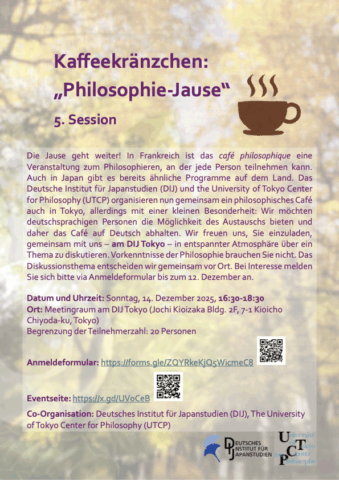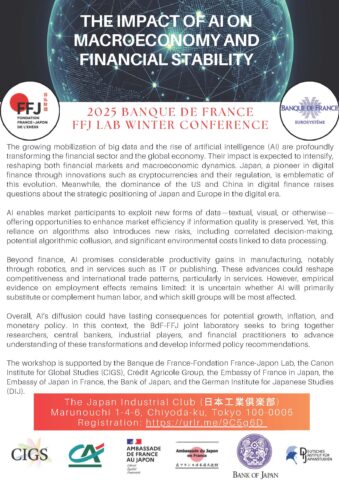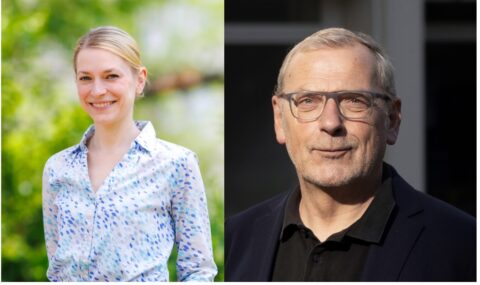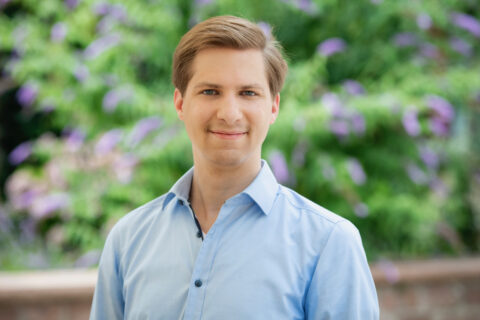Events and Activities
Hybrid DIJ Study Group on the Political Economy of U.S. Military Bases
 This talk provides an overview of the economic and political impacts of the presence of U.S. military bases in Japan. International relations research has traditionally examined U.S. bases qualitatively, treating them as an outcome of U.S. global security strategy. In contrast, military economics focus on the economic effects of base closures and realignments in the United States and Europe. Studies examining the impact of U.S. bases on Japan remain scarce. This research addresses this gap by presenting the historical and strategic background of U.S. bases in Japan, alongside empirical evidence and case studies that illustrate the effects of these bases on surrounding communities. The project employs a mixed-methods design and explores the relationship between U.S. bases and Japanese municipalities using the original dataset “The United States Bases in Japan”, which draws on a wide range of primary and secondary sources. Details and registration here
This talk provides an overview of the economic and political impacts of the presence of U.S. military bases in Japan. International relations research has traditionally examined U.S. bases qualitatively, treating them as an outcome of U.S. global security strategy. In contrast, military economics focus on the economic effects of base closures and realignments in the United States and Europe. Studies examining the impact of U.S. bases on Japan remain scarce. This research addresses this gap by presenting the historical and strategic background of U.S. bases in Japan, alongside empirical evidence and case studies that illustrate the effects of these bases on surrounding communities. The project employs a mixed-methods design and explores the relationship between U.S. bases and Japanese municipalities using the original dataset “The United States Bases in Japan”, which draws on a wide range of primary and secondary sources. Details and registration here
Hybrid DIJ Study Group on Industrial Policy and Technology Transfer in Postwar Japan

Was the postwar economic miracle a result of the Japanese government’s industrial policy, or did it occur despite it? Numerous studies on the effects of government policy on industrial growth have produced contradictory or inconclusive findings. In this talk, Krautter argues that one of the main instruments of industrial policy toward growth industries was the licensing system for technology imports. Focusing on technology policy, he finds that the licensing system positively influenced the terms and conditions of technology imports. Krautter contends that the government’s role in postwar industrial development was more that of a coordinator rather than of a “leader” or “guide.” This view is reflected in the description of the Japanese state as a coordination state, contrasting with the well-known concept of the developmental state. Details and registration here
Deutschsprachiges Kaffeekränzchen „Philosophie-Jause“
 Die Jause geht weiter! In Frankreich ist das café philosophique eine Veranstaltung zum Philosophieren, an der jede Person teilnehmen kann. Auch in Japan gibt es bereits ähnliche Programme auf dem Land. The University of Tokyo Center for Philosophy (UTCP) und das Deutsche Institut für Japanstudien (DIJ) organisieren gemeinsam ein philosophisches Café auch in Tokyo, allerdings mit einer kleinen Besonderheit: Wir möchten deutschsprachigen Personen die Möglichkeit des Austauschs bieten und daher das Café auf Deutsch abhalten. Das Organisationsteam (Yukiko Kuwayama, UTCP und Sebastian Polak-Rottmann, DIJ) freut sich, Sie wieder ins DIJ Tokyo einzuladen, um gemeinsam in entspannter Atmosphäre über ein Thema zu diskutieren. Fachliche Vorkenntnisse benötigen Sie nicht. Bei Interesse melden Sie sich bitte bis zum 12. Dezember an. Weitere Informationen hier
Die Jause geht weiter! In Frankreich ist das café philosophique eine Veranstaltung zum Philosophieren, an der jede Person teilnehmen kann. Auch in Japan gibt es bereits ähnliche Programme auf dem Land. The University of Tokyo Center for Philosophy (UTCP) und das Deutsche Institut für Japanstudien (DIJ) organisieren gemeinsam ein philosophisches Café auch in Tokyo, allerdings mit einer kleinen Besonderheit: Wir möchten deutschsprachigen Personen die Möglichkeit des Austauschs bieten und daher das Café auf Deutsch abhalten. Das Organisationsteam (Yukiko Kuwayama, UTCP und Sebastian Polak-Rottmann, DIJ) freut sich, Sie wieder ins DIJ Tokyo einzuladen, um gemeinsam in entspannter Atmosphäre über ein Thema zu diskutieren. Fachliche Vorkenntnisse benötigen Sie nicht. Bei Interesse melden Sie sich bitte bis zum 12. Dezember an. Weitere Informationen hier
Hybrid DIJ Study Group on Rape in Contemporary Japanese Women’s Literature
Rape represents a recurring theme in Japanese women’s literature. Even the earliest works created by Japanese women tell of rape, though over time these stories have been usurped and reinterpreted as tales of seduction and eroticism. While this reflects an androcentric worldview that still shapes perceptions of rape, Japanese women writers have long offered criticism and counter-concepts. Since the 1980s, as the discussion about sexual violence against women began in Japan, women authors have used literature to challenge androcentric conceptualizations of rape by writing from a female rape survivor’s perspective, criticizing romanticized and eroticized depictions by male authors. They contribute to breaking the taboo surrounding rape in everyday life, offering insight into women’s experiences and survival. This presentation examines selected works by contemporary Japanese women writers since the 1980s, comparing depictions of rape, trauma, and societal responses to show changes in the perception of raped women. Details and registration here
Speaker: Marija Tomic, University of Vienna/DIJ Tokyo
Workshop on Impact of AI on Macroeconomy and Financial Stability

The growing mobilization of big data and the rise of artificial intelligence (AI) are profoundly transforming the financial sector and the global economy. Their impact is expected to intensify, reshaping both financial markets and macroeconomic dynamics. Japan, a pioneer in digital finance through innovations such as cryptocurrencies and their regulation, is emblematic of this evolution. Meanwhile, the dominance of the US and China in digital finance raises questions about the strategic positioning of Japan and Europe in the digital era. AI enables market participants to exploit new forms of data, offering opportunities to enhance market efficiency if information quality is preserved. Yet, this reliance on algorithms also introduces new risks, including correlated decision-making, potential algorithmic collusion, and significant environmental costs linked to data processing. This workshop brings together researchers, central bankers, industrial players, and financial practitioners to advance understanding of these transformations and develop informed policy recommendations. Details and registration here
Hybrid Sustainability Forum on Climate Crisis and Environmental Attitudes in Japan

Despite the increasingly tangible effects of climate change in Japan the population continues to show comparatively low levels of climate concern. While the Japanese government has set ambitious carbon reduction targets, international observers have criticised the absence of concrete measures to achieve them. Domestic public responses, however, remain limited, and interest in the topic among the population appears to be waning. Using original data from a nationwide survey conducted in September 2025, the speakers analyze how climate awareness, disinterest, and pro-environmental attitudes vary across groups, focusing on how fear, grief, guilt, shame, and “climate nostalgia”, the fear of losing familiar seasonal and cultural elements, shape engagement and detachment from the climate crisis in Japan. The presentations will be followed by a Q&A session and a small reception. Details and registration here
Sighard Neckel, University of Hamburg
Hybrid DIJ Study Group on Japan’s Industrial Policy and the Global Chip War

Amid the convergence of multipolarity and polycrisis, great powers leverage their strengths to adapt, while “trading states” such as Japan and Germany must recalibrate foreign policies long aligned with the liberal order. At the same time, the Japanese LDP-led government, seeing the risks and opportunities associated with the global AI boom and the global chip war, has ushered in a renaissance of its historical industrial policy. Using an updated version of Rosecrance’s “trading state” concept and theory-testing process tracing, Steven Schwarz examines the political economy behind Germany’s and Japan’s foreign policy amid the Russian war in Ukraine and the “Chimerica” crisis. He also analyzes Japan’s new semiconductor industrial policy through the multiple-streams framework, highlighting the roles of bureaucratic and economic actors in its industrial policy renaissance. Details and registration here
Speaker: Steven Schwarz, Heidelberg Academy of Sciences and Humanities
DIJ Forum on Memory Culture in Germany and Japan

Eight decades after the end of the Second World War, Germany’s dealing with its past still attracts attention as exemplary or exceptional. In East Germany, a doctrinal anti-fascism soon prevailed, while in West Germany, the path to a self-critical confrontation with the past was taken: a decades-long, arduous process marked by social learning successes, but also by setbacks and scandals. Historian Norbert Frei provides an overview of how Germans have dealt with their Nazi history and analyzes the current state of Germany’s memory culture. Former diplomat Yoshinori Katori will offer a comparative perspective on memory culture in Japan with a focus on current issues of historical reconciliation between Japan and South Korea. The presentations will be followed by a Q&A session and a small reception. This is an onsite only event. Details and registration here
Yoshinori Katori, Japan-Korea Cultural Foundation





 Open Access
Open Access
